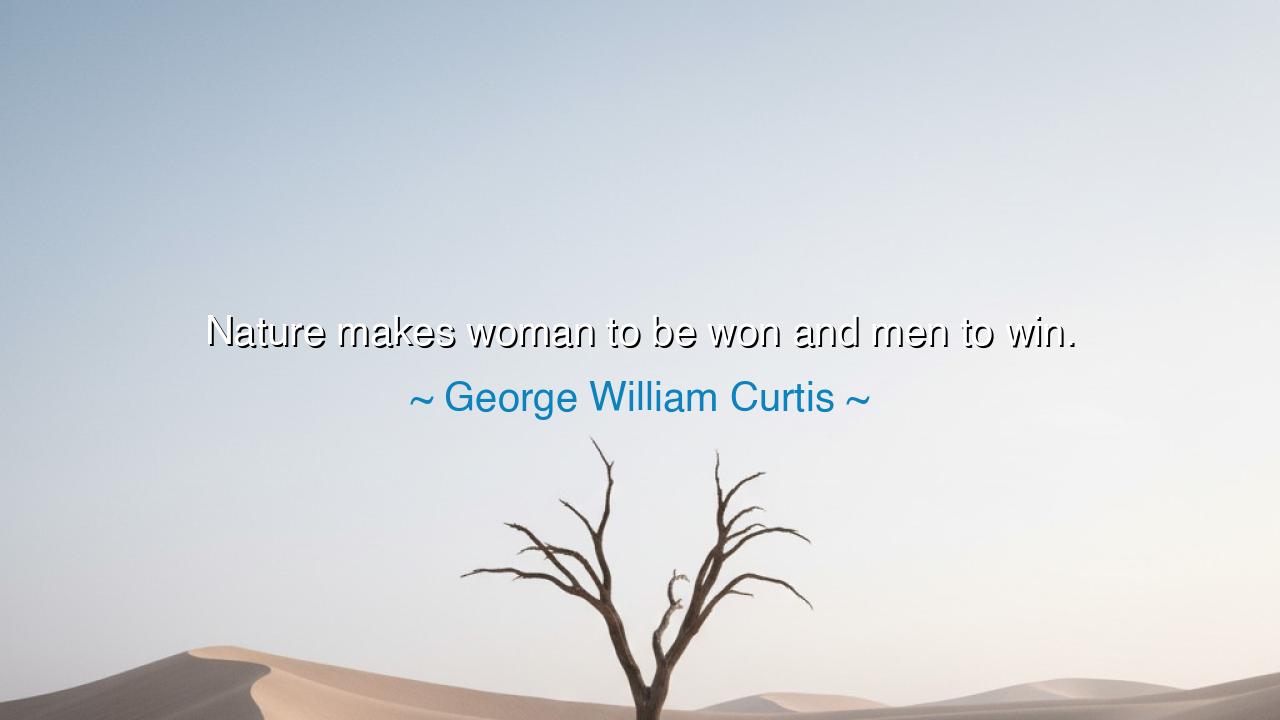
Nature makes woman to be won and men to win.






The words of George William Curtis, “Nature makes woman to be won and men to win,” echo with the voice of an older age, when human roles were imagined as fixed by the design of the cosmos itself. In them we hear the ancient belief that courtship and union are not accidents, but part of a great drama written by Nature—with men cast as seekers and strivers, and women as the prize, radiant and waiting to be claimed. Whether one agrees or not with this division, it speaks of the deep yearning within humanity to find meaning and order in the dance between the sexes.
The origin of this thought lies in traditions both mythic and cultural. From the tales of the Greeks, where heroes braved trials to win queens and goddesses, to medieval Europe, where knights rode forth in perilous quests to win the favor of a lady, the pattern has been repeated: men to win, women to be won. It reflects not only romance, but the way societies once understood power, inheritance, and desire—assigning the role of pursuit to men and the role of choice to women, who bestowed their favor like a crown.
Consider the story of Penelope and Odysseus. Though Odysseus journeyed for twenty years, battling gods and monsters to return home, Penelope remained steadfast, surrounded by suitors who sought to win her hand. Yet in her quiet strength, she too was not passive, weaving and unweaving her loom to resist them until her true husband’s return. Here we see that though Curtis spoke of women being “won,” history reveals that women often hold hidden power in the drama, shaping the outcome as much as the man who seeks.
Yet there is also a deeper wisdom hidden in this old saying. To win does not mean to conquer by force, but to strive, to prove oneself worthy, to labor for honor and devotion. To be won does not mean to submit, but to be cherished as a treasure of surpassing worth. In this way, the quote may be understood not as subjugation, but as recognition of the mutual roles in love’s eternal struggle: one gives pursuit, the other bestows acceptance, and in their union both are exalted.
Still, the words remind us of how societies once bound gender in rigid roles. Today, the dance of love is no longer so fixed: women also strive and achieve, and men also wait, hoping to be chosen. The balance shifts with time, yet the yearning remains the same—the desire to be valued, to seek and to be sought, to love and to be loved.
Let the generations remember: behind Curtis’s saying lies not merely the power of men or the patience of women, but the eternal truth that love is a struggle, a pursuit, a prize, and a gift. And though the roles may change, the great story of seeking and being sought continues, as old as Nature itself.






NPNha Phuong
While George William Curtis' quote might have been reflective of traditional views on romance, it also raises questions about gender expectations. The idea of men always being the 'winner' suggests a hierarchical view of relationships. In today’s world, shouldn’t we be looking for ways to build partnerships where both individuals can 'win' by contributing to one another’s growth and happiness? How can we redefine this concept to be more inclusive and balanced?
NLVo Nhi Lam
The quote seems to imply a competitive dynamic that could be harmful. By framing women as something to be won, it reduces their autonomy and the idea of a relationship to a game. What would happen if we viewed relationships as partnerships, where both individuals 'win' together, supporting each other’s growth? Could this shift in perspective lead to healthier and more fulfilling relationships?
Ppurple
George William Curtis' quote highlights a stark gender divide that has persisted throughout history, but I wonder how it would be perceived today. In modern society, where women are becoming more empowered and independent, does this idea still hold any weight? Isn’t it time for both women and men to be equally engaged in the process of winning each other’s hearts, rather than placing one in a passive role?
QHDang Quang Huy
This quote makes me reflect on the societal pressure placed on men to constantly compete for a woman’s attention or affection. While it might have been true in earlier times that women were seen as prizes, shouldn’t we be striving for a more balanced and modern view where both individuals in a relationship actively contribute and 'win' together? What might a partnership look like if both parties were equally invested in winning, rather than adhering to these outdated roles?
HLvan hai le
George William Curtis' quote feels quite outdated and reinforces traditional gender roles. The idea that women are meant to be 'won' and men to 'win' perpetuates the notion of a power imbalance between the sexes. Shouldn't relationships be based on equality and mutual respect, rather than one person being the prize to be claimed? How can we move past such limiting definitions of gender roles to build healthier, more equitable relationships?